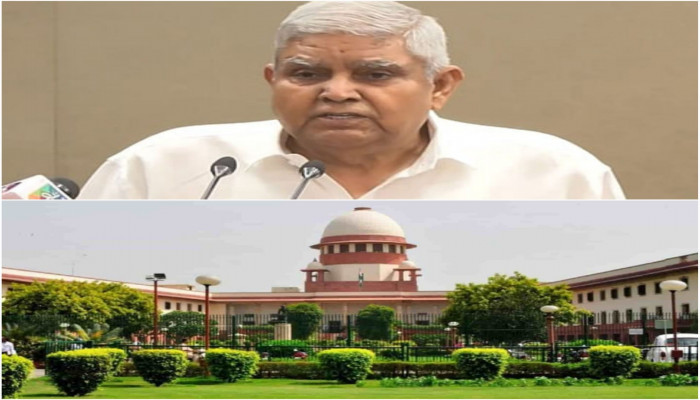Vice President slams judiciary for overreach, says 'you can’t direct the President' after SC’s recent ruling
- In Reports
- 05:59 PM, Apr 17, 2025
- Myind Staff
Vice President Jagdeep Dhankhar has strongly condemned a recent Supreme Court ruling that instructs the President to take action within a set timeframe on bills sent by governors for review. He described the decision as troubling, arguing that India was never intended to have a democracy where judges act as lawmakers, the executive, or even a "super Parliament." He questioned, "There is a directive to the President by a recent judgement. Where are we heading? What is happening in the country?" while speaking to a group of Rajya Sabha interns.
Last week, the Supreme Court ruled that when a governor sends a bill to the President for review under Article 201 of the Constitution, a decision must be made within three months. This ruling came as part of a verdict that criticised the Tamil Nadu Governor for delaying action and withholding approval of state bills. The court emphasised that the President has no option of a "pocket veto" and must either approve or reject the bill within a reasonable time.
Describing the situation as unprecedented, Dhankhar stated, “We never bargained for democracy for this day. The President is called upon to decide in a time-bound manner, and if not, becomes law.” He raised concerns about what he considered judicial overreach, saying, “So we have judges who will legislate, who will perform executive functions, who will act as super Parliament, and absolutely have no accountability because the law of the land does not apply to them.”
Worried about the diminishing respect for constitutional limits, the Vice President reminded the audience of the President's oath, “to preserve, protect and defend the Constitution.” He pointed out that the President occupies a unique and higher position, unlike others who simply pledge to “abide by the Constitution.” He questioned, “We cannot have a situation where you direct the President of India and on what basis?” Referring to constitutional provisions, he explained that the judiciary’s only role in such matters is “to interpret the Constitution under Article 145(3),” which too must be done by a bench of five or more judges.
The Supreme Court, while addressing the Tamil Nadu government's challenge to the Governor's delay, stated that constitutional officials must act within a reasonable timeframe, even if the law does not specify a particular deadline. “The position of law is settled that even where no time-limit is prescribed for the exercise of any power under a statute, it should be exercised within a reasonable time,” the court cited.
The bench of Justices, consisting of JB Pardiwala and R Mahadevan, stated that the judiciary can review the President's delay in addressing bills. If no action is taken within three months, the court emphasised that valid reasons must be documented and communicated to the concerned state. The judgment also made it clear that if there are concerns about whether a bill is constitutionally valid, it is not the role of the executive to make that decision. The court stated, “Only the constitutional courts have the prerogative to study and provide recommendations.”







Comments